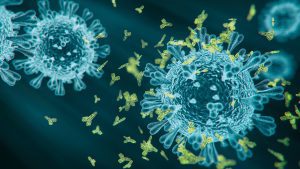
An international research team has discovered that immune particles in llama blood may provide robust protection from all variants of COVID and can potentially be developed into an antiviral treatment to combat future pandemics.
The study identified that these minuscule particles – known as nanobodies – can safeguard from all variants of COVID, including Omicron, in addition to 18 similar viruses such as SARS-CoV-2 and SARS-CoV-1, which caused the SARS outbreak in 2003.
Researchers believe these “super immunity” molecules can be modified into a rapid-acting, inhalable antiviral treatment or spray that can be utilised to combat all COVID variants and future virus outbreaks.
The study, which was led by Mount Sinai, included experts from Scripps Research, Case Western Reserve University, University of Pittsburgh, Hebrew University, and Tel Aviv University, and is published in Cell Reports.
How do llama nanobodies work?
Llamas, camels, and alpacas have unique immune systems compared to the rest of the animal kingdom because they produce antibodies comprised of a single polypeptide chain instead of two.
This leads to exceptionally stable antibodies around one-tenth the size of normal ones that can effectively bind to disease targets. These special properties enable researchers to link nanobodies together to create a daisy chain of nanobodies. This means that if a virus attempts to escape, another nanobody is there to combat it.

Yi Shi, PhD, the lead author of the study from Mount Sinai, commented: “Because of their small size and broad neutralising activities, these camelid nanobodies are likely to be effective against future variants of COVID and outbreaks of SARS-like viruses. Their superior stability, low production costs, and the ability to protect both the upper and lower respiratory tracts against infection mean they could provide a critical therapeutic to complement vaccines and monoclonal antibody drugs if new COVID variants or SARS-CoV-3 emerges.”
Protection against COVID variants
For their study, the team immunised a llama called Wally with the SARS-CoV-2 receptor binding domain (RBD), which is the spike of the virus that attaches to the surface protein of human cells to cause infection.
They discovered that repeating this process caused Wally to produce nanobodies that not only recognised SARS-CoV-2 that causes COVID-19 but a range of other coronaviruses. This allowed the scientists to isolate and validate an extensive array of highly potent antiviral nanobodies that are effective against all variants of COVID.
Ian Wilson, PhD, a co-author of the study from Scripps Research, explained: “We learned that the tiny size of these nanobodies gives them a crucial advantage against a rapidly mutating virus. Specifically, it allows them to penetrate more of the recesses, nooks, and crannies of the virus surface, and thus bind to multiple regions to prevent the virus from escaping and mutating.”
The team utilised this structural information to construct an ultrapotent nanobody – called PiN-31 – that can bind to two areas on the RBD of SARS-like viruses to block mutational escape. PiN-31 is extremely stable and can be employed as an inhaled treatment or spray in its aerosolised form, which the team has demonstrated to be effective against SARS-CoV-2 in previous work.
Dr Shi concluded: “While more research is needed, we believe that the broad protection, ultrapotent nanobodies we were able to isolate in the lab can be harnessed for use in humans. These highly versatile antiviral agents can be rapidly produced virtually anywhere from microbes such as E.coli or yeast cells.
“Winning the race against the current pandemic, as well as future viral outbreaks, will depend on fast development and equitable distribution of an arsenal of cost-effective and convenient technologies. We strongly believe that the novel, inhalable, and extremely potent nanobodies we’ve discovered can meet that demand on a global scale, particularly in developing countries that are most vulnerable to viruses and the lack of therapies to treat them.”
Nanobody therapies have previously been clinically proven as safe against human diseases like cancer and blood clotting disorder.
























